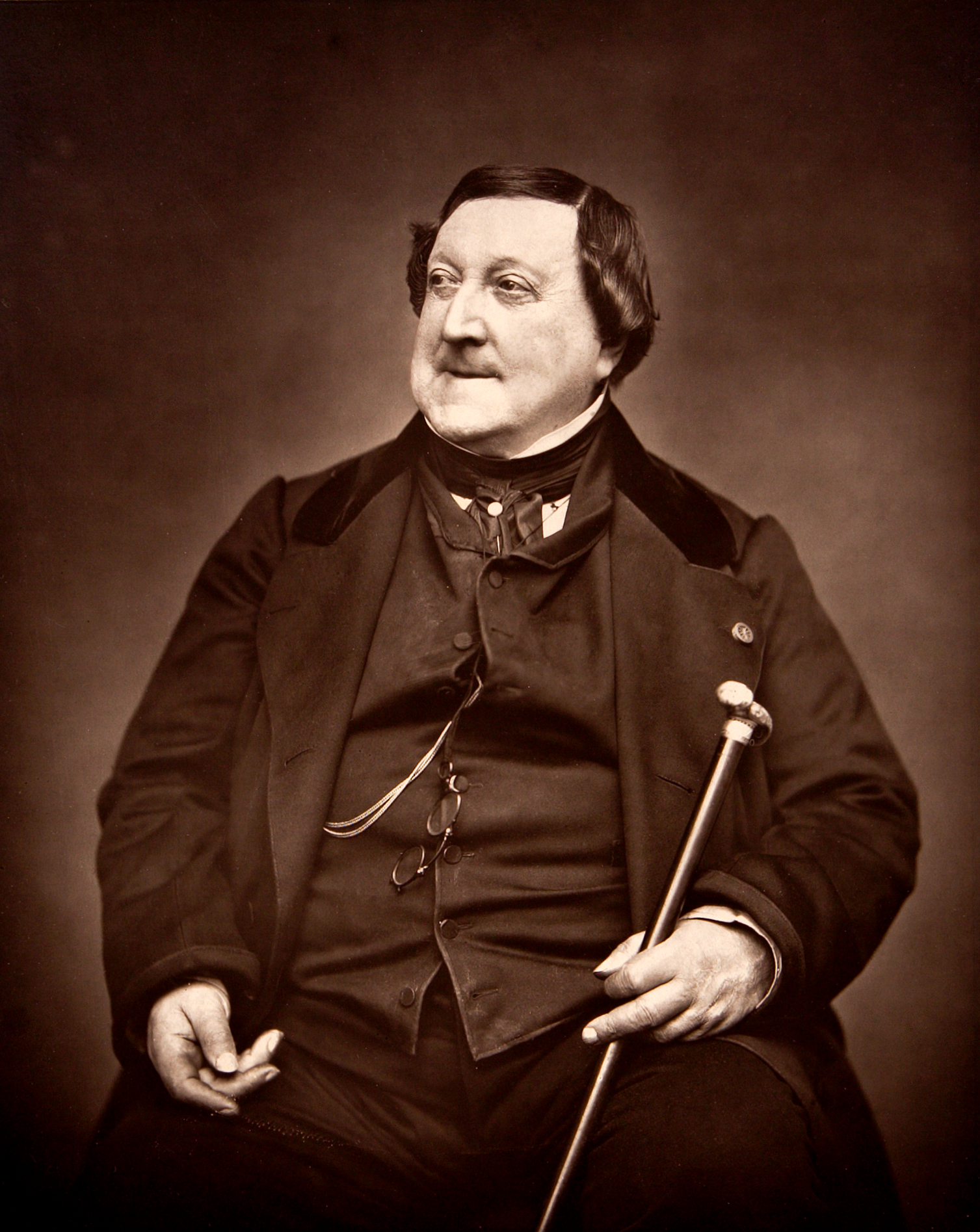PLOT
An inn-full of aristocratic tourists heading for Reims for the coronation are stranded (no horses) and decide to celebrate the event right where they are.
Several prestigious guests have been staying at The Golden Lily Hotel and Spa on their way to the coronation of Charles X, in Reims. The day of the coronation has finally arrived, and the hotel is alive with the preparations for this grand journey. During their stay, the travellers have got to know each other’s particular quirks, and have formed new friendships and relationships. But all of this drama could not prepare them for some tragic news: there are no horses available to pull their coach to Reims. Their plans will have to be abandoned.
The company are quickly saved from despair by a letter from Paris, which informs them that the new King will be heading to Paris shortly after the coronation, so anyone who missed the great event can join in the festivities there. Overjoyed at this news, and with money to spare, the travellers decide to hold a grand banquet at the hotel instead. A travelling troupe of dancers are brought in to perform during the celebrations, and each traveller performs a toast from their homeland, in a celebration of grandeur, splendor, culture, and, of course, France.
ACT BY ACT
”The Journey to Reims”
Opera in 3 acts
Sung in Italian
About 2 hours 40 min + intervals
The Golden Lily spa hotel at Plombières-les-Bains in France in 1825
Act 1
Scene 1
Introduction
The housekeeper Maddalena is unhappy with the preparations made by the servants for the arrival of the important people who are travelling to Reims for the coronation of Charles X of France. ("Presto, presto ... su, corraggio") The servants repudiate her assertions. The hotel's doctor, Don Prudenzio, announces that, because of the impending arrivals, the normal business of the spa will be suspended. The spa attendants rejoice and depart. He checks with Antonio that his instructions about the necessary meals for the visitors have been followed.
Madame Cortese, the proprietress of the hotel, appears. She regrets that she will be unable to attend the coronation ("Di vaghi raggi adorno"), but is keen to show off the hotel to the visitors in the hope that they will return some day to take the waters. She particularly requests that everyone should be enthusiastic about each of the travellers' specific interests. Everyone agrees, and she is left alone.
Scene 2
The Countess of Folleville's arrival
The Countess calls for her maid, Modestina, and Madame Cortese goes to search for her. Modestina appears, and the Countess, worried that her clothes have not yet arrived, asks why there has been no reply to a letter that she had sent. Modestina had entrusted the letter to the Countess's cousin, Don Luigino, who immediately arrives to say that the stagecoach which he had hired to carry the boxes had overturned on the way. The Countess faints and Don Luigino calls for help.
Maddalena, Antonio, Don Prudenzio and the servants arrive, together with Baron Trombonok. Don Prudenzio and the Baron argue about how to resuscitate the Countess, but she recovers sufficiently to lament the loss of her garments. ("Partir, o ciel! desio") However, when Modestina appears with a large box containing a beautiful Paris bonnet, she rejoices that it, at least, has been saved from the accident. ("Che miro! Ah! Quel sorpresa!") Everyone is amused by this sudden turn of events, and all except Antonio and the Baron depart.
Scene 3
Sextet
After agreeing with the Baron the arrangements for the party's departure in the evening, Antonio leaves. The Baron cannot help laughing at the Countess's sudden recovery and the insanity of the world in general. He is joined by Don Profondo, Don Alvaro, the Marquise Melibea, Count Libenskof. It is clear that Don Alvaro and the Count are rivals for the Marquise's affections. They are all waiting for the new horses which will be necessary for the continuation of the journey, but Madame Cortese, who now arrives, says that she cannot understand why they have not arrived. Alvaro and Libenskof quarrel, the ladies are alarmed, and the Baron and Don Profondo are amused by the idiocy of lovers. ("Non pavento alcun periglio")
A harp prelude is heard, and the poetess Corinna sings offstage of brotherly love, to everyone's delight. ("Arpa gentil")
Act 2
Scene 1
Lord Sidney's aria
Madame Cortese is still waiting for the return of her servant Gelsomino with news of the horses. Lord Sidney approaches, and she muses on his unwillingness to approach Corinna who, she is sure, reciprocates his love.
Sidney, alone, laments his situation. ("Invan strappar dal core") His mood lifts when girls singing in praise of Corinna enter with flowers, but then he is disturbed by Don Profondo's strange requests for information about the location of antiquities, and departs.
Scene 2
Corinna's duet with the Chevalier Belfiore
Profondo is joined by Corinna and her companion Delia. Corinna asks when the party is to depart, and he and Delia leave Corinna alone while they go to see whether the horses have arrived.
Corinna is joined by the Chevalier, who declares his love. ("Nel suo divin sembiante") She is taken aback and repudiates him. The Chevalier retreats, hoping to try again later, and Corinna returns to her room.
Scene 3
Don Profondo's aria
Don Profondo, who has seen the Chevalier with Corinna, reflects that the Countess will scratch the Chevalier's eyes out if she finds out what he has been doing. He then turns his attention to enumerating the effects of his fellow-travellers (as requested by the Baron), noting that their possessions tend to sum up their each of their nations' characteristics. ("Medaglie incomparabili") He looks forward to the impending departure.
The Countess appears, looking for the Chevalier. She is not pleased when Don Profondo tells her that he has been having a poetry lesson. Don Alvaro and Count Libenskof join them, asking about the horses, and the Baron, too, appears, looking woebegone. What has happened? The rest of the travellers arrive, and the Baron produces the courier Zefirino, who is obliged to report that there are no horses to be had anywhere, not even for ready money. There will be no journey to Reims for the coronation!
Scene 4
Grand concerted ensemble for 14 voices
Everyone is horrified. ("Ah! A tal colpo inaspettato") But Madame Cortese appears with a letter from Paris. Don Profondo reads it out: the King will return from Reims in a few days and there will be great festivities. Anyone who was unable to get to Reims will be consoled by an even finer spectacle. The Countess steps forward to invite the entire company to her home in Paris for the celebrations. A stagecoach will convey them there on the following day, but in the meantime a grand banquet, with invitations to the public, will be held at the Golden Lily, paid for with the money that would have been spent at the coronation. Any money left over will be given to the poor.
Act 3
Scene 1
Duet for the Count and the Marquise
When everyone else has left, the Baron tries to reconcile the jealous Count with the Marquise, who has been seen with Don Alvaro. When he departs, the misunderstanding is resolved and harmony is restored. ("D'alma celeste, oh Dio!")
They depart, and the scene changes to the hotel's garden. Antonio and Maddalena ensure that all is prepared for the banquet. The Baron has engaged a travelling company to provide entertainment with singing and dancing.
Scene 2
Finale
After the opening chorus ("L'allegria è un sommo bene"), the Baron introduces a series of short national songs sung by each of the travellers, some of them set to well-known tunes, and ending with, first, a French anthem (the Marche Henri IV) for the Duchesse de Berry,[8] then a rustic Tyrolean duet for Madame Cortese and Don Profondo, and finally an improvised solo for Corinna on one of a number of mostly French subjects suggested by each traveller and drawn from an urn. The winning subject turns out, appropriately enough, to be "Charles X, King of France". The opera ends with dances and a chorus.
ROLES
Madame Cortese – Soprano (lyric coloratura)
Tyrolean hostess of the spa hotel
Contessa di Folleville – Soprano (dramatic coloratura)
A fashionable young widow
Corinna – Soprano (lyric coloratura)
A famous Roman poetess
Marchesa Melibea – Contralto
The Polish widow of an Italian general killed on their wedding night
Conte di Libenskof – Tenor
Russian general in love with Marchesa Melibea
Chevalier Belfiore - Tenor
Handsome young French officer and spare-time painter
Lord Sidney - Bass
English colonel secretly in love with Corinna
Don Alvaro - Bass
Spanish admiral in love with Marchesa Melibea
Barone di Trombonok - Bass
German major and music lover
Don Profondo - Bass
Scholar and lover of antiquities, friend of Corinna
Don Prudenzio - Bass
Doctor at the spa
Modestina - Mezzo-soprano
The Contessa di Folleville's chamber maid
Don Luigino - Tenor
Cousin of the Contessa di Folleville
Maddalena - Mezzo-soprano
Hotel housekeeper from Normandy
Antonio - Baritone
Maître d'hotel
Zefirino - Tenor
Courier
Gelsomino - Tenor
Valet
Delia - Soprano
Young Greek girl who is Corinna's travelling companion
COMPOSER
Gioachino Rossini
1792 - 1868
Place of birth: Pesaro, Italy
place of death: Paris, France

BIOGRAPHY
Gioachino Rossini was an Italian composer known for shaping the style of Bel canto together with Bellini and Donizetti. He was born in Pesaro in a musical family and started music school in Bologna at the age of 12. His father was a trumpeter and his mother was a singer. During his career he wrote 39 operas, sacred music, chamber music, piano pieces and songs.
Rossini married the singer Isabella Colbran in 1822. It was a difficult marriage. Rossini wrote many roles for her, but her voice gradually declined and she was forced to retire. It put a strain on their relationship. They lived separately from 1830 when Rossini met Olympe Pélissier who was to become his future wife. In 1835 Rossini and Colbran officially divorced and 10 years later he married Pélissier who was his wife until his death. Rossini died in Paris after an unsuccessful operation to treat colorectal cancer at the age of 76.
Rossini was a very productive composer, writing on an average 2 operas per year for 19 years. However, for the last 40 years of his life he didn’t compose a single opera. It’s unknown why he stopped, but perhaps his declining health or financial security thanks to earlier successes gives us a clue. His most popular opera is Il barbiere di Siviglia, one of his many comic operas.
COMPOSER'S QUOTE
"Give me a laundry-list and I'll set it to music."
FUN FACTS
He was a celebrity during his lifetime. He suffered from insomnia. He met with Beethoven in 1822.
Most prominent operas
L’italiana in Algeri 1813
Il turco in italia 1814
Il barbiere di Siviglia 1816
La cenerentola 1817
Semiramide 1823
Il viaggio a Reims 1825
Le comte Ory 1828
Guillaume Tell 1829
LIBRETTO
Luigi Balocchi
1766-1832
The Italian libretto was written by Luigi Balocchi, based in part on Corinne ou l'Italie by Germaine de Staël. Luigi Balocchi worked with Rossini in Paris at the Théâtre Italien.
SCORE
SCORE NOT AVAILABLE
CONTEXT
Il viaggio a Reims premiered at Théâtre Italien in Paris in 1825.
VIDEOS
FULL LENGTH OPERA
Act 2
Aria - All'ombra amena del Giglio d'or (Corinna)

















